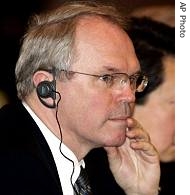2007年VOA标准英语-Negotiators Trying to Persuade Pyongyang to Ful(在线收听)
Beijing
08 February 2007
China, the host of ongoing talks aimed at ending North Korea's nuclear weapons programs, is drafting a joint statement of actions the North would agree to take within weeks. Although details of the statement are not yet clear, negotiators say it is aimed at implementing promises Pyongyang made two years ago. VOA's Kurt Achin reports from Beijing.
U.S. Assistant Secretary of State Christopher Hill says the first day of talks in Beijing aimed at getting rid of North Korea's nuclear weapons went "pretty well."

Christopher Hill listens to a speaker during opening of another round of six-party talks, 8 Feb 2007
"We were able to make progress in discussing de-nuclearization that we were not able to do in December," he said.
December was the last time the United States, South Korea, Japan, China and Russia joined in negotiations aimed at persuading North Korea to end its nuclear programs in exchange for diplomatic and economic benefits. The six-nation process has been unsuccessful for more than three years, and North Korea conducted its first nuclear weapons test in October.
Hill says China is expected to issue a draft of a joint statement for these latest talks by Friday.
"The idea is that these would be a set of actions, not a set of pledges, a set of actions, that would need to be taken in a finite amount of time," he added.
Hill describes that period of time as "single-digit weeks", although he would not provide any details about what actions are under discussion.
He said they would start the process of implementing promises North Korea made at the September 2005 session of the six-party talks.
North Korea boycotted talks aimed at implementing those 2005 pledges, after the United States blacklisted a Macau-based bank accused of helping North Korea launder money and circulate counterfeit U.S. currency. Pyongyang has said there will be no progress on the nuclear issue until the U.S. financial sanctions are lifted.
U.S. Treasury officials have held two sets of parallel track discussions with North Korean envoys on the financial issue, which Washington says is separate from the nuclear diplomacy. Last month, Ambassador Hill held three days of talks in Berlin with his North Korean counterpart Kim Kye Kwan, fueling speculation the two countries may soon reach a compromise.
Many experts have predicted this week's Beijing talks will yield at least a partial lifting of the financial sanctions, in exchange for some incremental steps by North Korea to dismantle its weapons programs. There has been speculation the North will offer to freeze plutonium production at its main nuclear facility in Yongbyon.
Hill emphasizes a more permanent solution is needed.
"I really do not like to hear this word 'freeze.' We are not interested in freezing something. We are interested in addressing problems created by plutonium production in North Korea," he said.
The United States and its regional partners have maintained that any progress in the nuclear negotiations must be verified by international inspectors, most likely from the U.N. Atomic Energy Agency.